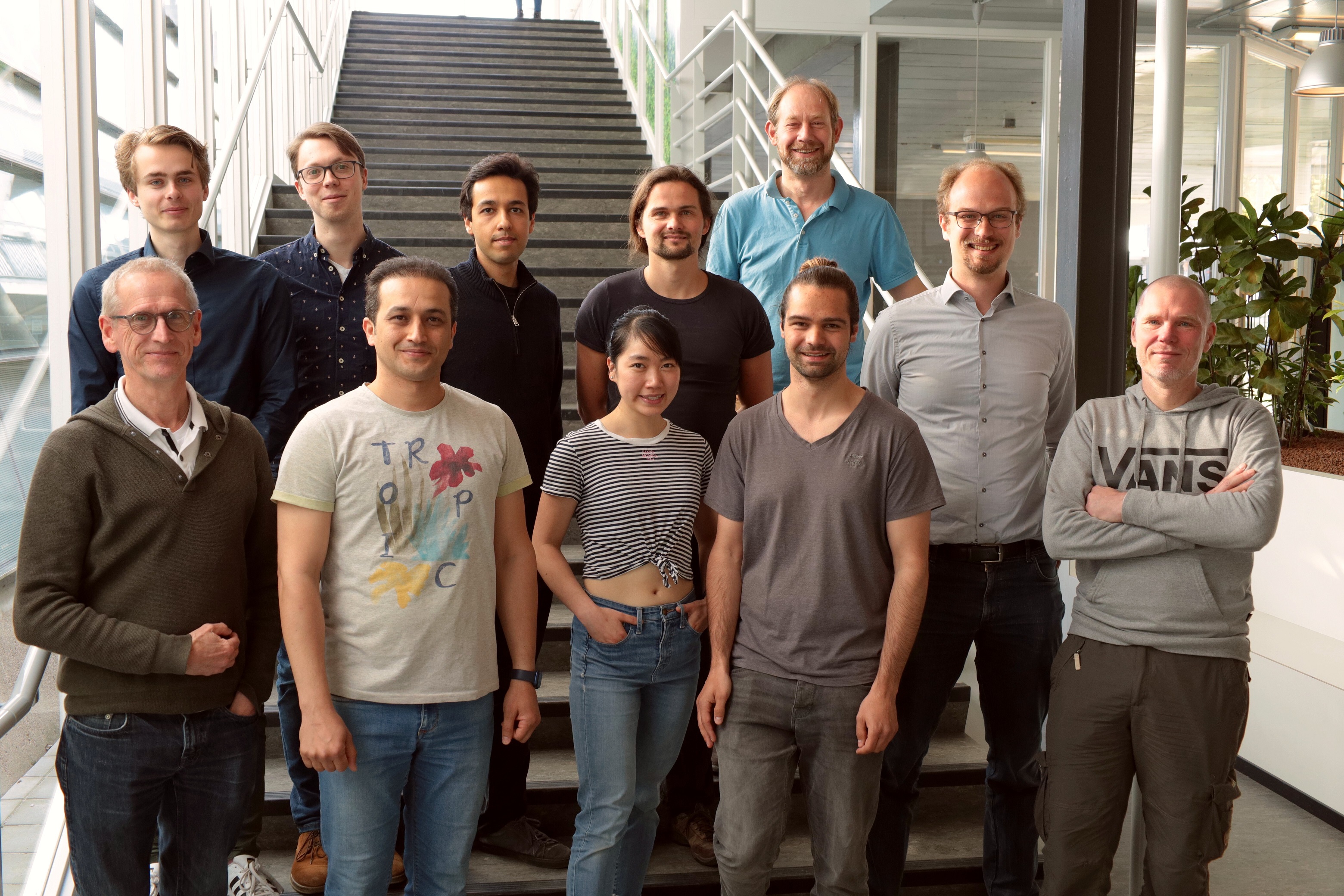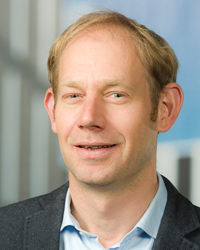Sense Jan van der Molen
Scientific Director / professor
- Name
- Prof. dr. ir. S.J. van der Molen
- Telephone
- 071 5275708
- wd-lion@physics.leidenuniv.nl

In the Van der Molen lab, we investigate the electronic properties of low-dimensional quantum materials such as van der Waals materials and molecular layers, with an enthusiastic scientific team. To answer our research questions, we use methods based on low-energy electron microscopy (LEEM) as well as complementary techniques (charge transport, AFM, etc.). If needed, however, we will expand our research possibilities by introducing new methods. The instrumentation required for that is done in collaboration with the Leiden fine mechanical and electronics departments. In this way, we stand in a long Leiden Physics tradition that includes Van Musschenbroek and Kamerlingh Onnes. Novel scientific techniques introduced by our group are LEEM-based potentiometry (LEEP), angle-resolved reflected-electron spectroscopy (ARRES) and transmission electron microscopy operating at very low energies (eV-TEM). At present we are working on the development of Optical Near-field electron microscopy (ONEM), in collaboration with the Juffmann group in Vienna and the Amaro group in Prague. ONEM aims to combine the best of optical and electron microscopy techniques. The envisioned microscopy method is damage-free, requires no labels, and allows for live imaging at a resolution down to the 10-nanometer scale. For more information, please visit: Sense Jan van der Molen Lab - Physics of Quantum Materials - Leiden University Or check out the inaugural lecture (oratie) of Sense Jan given on October 21, 2022: https://youtu.be/Yoc29FqOA0o (in Dutch).
More information about Sense Jan van der Molen

PhD Candidates / Postdocs
News
-
 100 Years of Spin and Lorentz Medal Award Ceremony
100 Years of Spin and Lorentz Medal Award Ceremony -
 Academic freedom report: ‘This jewel in our crown deserves better care’
Academic freedom report: ‘This jewel in our crown deserves better care’ -
 The energy transition under the nanoscope: Gravitation funding for ANION project
The energy transition under the nanoscope: Gravitation funding for ANION project -
 Gravitation funding for five projects with Leiden researchers
Gravitation funding for five projects with Leiden researchers -
 Physicist Sense Jan van der Molen plays ‘Dutch shuffleboard’ with electrons
Physicist Sense Jan van der Molen plays ‘Dutch shuffleboard’ with electrons -
 Ivo van Vulpen is Professor of Science Communication in Leiden
Ivo van Vulpen is Professor of Science Communication in Leiden -
 The quest for the magic angle
The quest for the magic angle -
 NWA funding for communications research on quantum computing
NWA funding for communications research on quantum computing -
 New ONEM Microscope to combine best of two worlds
New ONEM Microscope to combine best of two worlds -
 First NWO Communication Award for Leiden Wall Formula project
First NWO Communication Award for Leiden Wall Formula project -
 8th wall formula about the Van der Waals-equation for gases
8th wall formula about the Van der Waals-equation for gases -
 Superconductivity with a twist explained
Superconductivity with a twist explained -
 LION in lockdown
LION in lockdown -
 Stacked graphene layers act as a mirror for electron beams
Stacked graphene layers act as a mirror for electron beams -
 Wall formula about Huygens' pendulum painted on Leiden fire brigade tower
Wall formula about Huygens' pendulum painted on Leiden fire brigade tower -
 MBO Rijnland students animate Leiden physics
MBO Rijnland students animate Leiden physics -
 Leiden involved in three out of five Physics Vrije Programma grants
Leiden involved in three out of five Physics Vrije Programma grants -
 Atoms use tunnels to escape graphene cover
Atoms use tunnels to escape graphene cover -
 Sense Jan van der Molen appointed as Professor Physics of Condensed Matter
Sense Jan van der Molen appointed as Professor Physics of Condensed Matter -
 New transmission microscope for low-energy electrons
New transmission microscope for low-energy electrons -
 Science students create audiotour past Leiden wall formulas
Science students create audiotour past Leiden wall formulas -
 Radio broadcast on Leiden wall formulas on BNR
Radio broadcast on Leiden wall formulas on BNR -
 Electrons give resist layer electrical charge
Electrons give resist layer electrical charge -
 New book on history electron microscopy including Leiden Physics
New book on history electron microscopy including Leiden Physics -
 Use the new audio tour to stroll past the Leiden wall formulas
Use the new audio tour to stroll past the Leiden wall formulas -
 Humidity switches molecular diode off and on
Humidity switches molecular diode off and on -
 Leiden Wall Formulas in Nature
Leiden Wall Formulas in Nature -
 Opening Event Three New Leiden Wall Formulas
Opening Event Three New Leiden Wall Formulas -
 Interactions in Designer Materials Unveiled
Interactions in Designer Materials Unveiled -
 LEELIS Conference on future of computer chips
LEELIS Conference on future of computer chips -
 Opening event wall formulas Snellius and Lorentz
Opening event wall formulas Snellius and Lorentz -
 Leiden Physics hosts 2016 NEVAC day
Leiden Physics hosts 2016 NEVAC day -
 New technique for Imaging Charge Transport in a Graphene Layered Cake
New technique for Imaging Charge Transport in a Graphene Layered Cake -
 Voltage at nanoscale: Leiden researchers win NeVac prize
Voltage at nanoscale: Leiden researchers win NeVac prize -
 Success for Leiden with Vidi subsidies
Success for Leiden with Vidi subsidies
In the media
Highlighted Publications
Recent theses
BSc Projects
Alumni
Teaching courses
Former PhD candidates
In the Van der Molen lab, we investigate the properties of low-dimensional materials, with an enthusiastic scientific team. We focus on two types of quantum systems: one-dimensional and two-dimensional.
One-dimensional
First, we investigate charge transport (conductance) through molecules. You can consider molecules as quasi one-dimensional quantum systems, with properties that are tunable by chemical synthesis. We have a specific interest in functional molecules, e.g. photochromic switches and spin-crossover compounds.
Two-dimensional
Second, we study the electronic properties of and charge transport in quasi two-dimensional systems. The most famous of these is undoubtedly graphene--a carbon layer of exactly one atom thick. But there are many more, such as hexagonal BN and MoS2. Remarkably, such layers can be stacked to create novel materials--called Van der Waals materials--with properites that we may be able to tune! To reach that point one day, we are accurately studying the electronic interaction between different layers within Van der Waals materials. We have a unique way to do this, thanks to our low-energy electron microscope (LEEM), that we have adapted to our needs.
LEEM
Our low-energy electron microscope (LEEM), is called ESCHER. Due to its aberration correction, it has a record lateral resolution of 1.4 nm. Still, our research program aims far beyond pure microscopy. One of our goals has been to make LEEM a key measurement system in condensed matter physics research as a whole and to use it for our research on Van der Waals materials, in particular thin oxides and molecular layers. Therefore we have recently introduced various new techniques:
- LEEM-based potentiometry, by Johannes Jobst
- Angle-resolved reflected-electron spectroscopy (ARRES)
- A novel form of transmission electron microscopy operating at very low energies (eV-TEM), by Daniël Geelen
As a result, 'LEEM' has become an umbrella term for a measurement system that incorporates a plethora of unique techniques that can be used in real-time (also including LEED, dark-field imaging and ARPES).

Scientific Biography
Sense Jan van der Molen, Full professor
I studied physics in Groningen, the Netherlands, following an exchange year in Olympia, Washington, USA. My Master project, carried out under the supervision of Prof. Teun Klapwijk, focussed on quantum mechanical interference effects in mesoscopic samples.
Next, I moved to the group of Prof. Ronald Griessen at the Vrije Universiteit Amsterdam to investigate so-called switchable mirrors. These metalhydrides, such as YHx, switch from perfect mirrors to transparent windows upon hydrogen uptake. My work focused on both the fundamentals of the metal-insulator transition and the possibility to manipulate the hydrogen concentration in these mirrors electrically (e.g. by electromigration).
In 2002, I joined the group of Prof. Bart van Wees in Groningen, the Netherlands, to start up a new research line in molecular transport. We put considerable effort in creating and optimizing new techniques to investigate single molecules. In a collaboration with Prof. Ben Feringa (Nobel prize in Chemistry, 2016), we focused on light-sensitive, switchable molecular devices (and somewhat on his motors). Furthermore, we explored the exciting field of spin transport through carbon nanotubes.
In 2005, I obtained an NWO talent grant to perform research in the group of Prof. Christian Schönenberger in Basel, Switzerland. After a pleasant and rewarding stay, I moved to Leiden in 2007.
Leiden
Here, I took up the challenge of building up my own research group. At first my main research focus was on molecular properties, and specifically on molecular charge transport. In November 2009, I received a personal VIDI-grant for my research. Furthermore, I have been part of several national and European research programs.
Presently, my main focus is on the electronic properties of two-dimensional systems. These do include molecular layers, but there is a further emphasis on so-called van der Waals systems. These materials consist of weakly coupled atomic sheets (put) on top of each other. An example is twisted bilayer graphene which features two graphene layers at a small twist angle. Remarkably, at certain twists, this system becomes a superconductor. Quite exciting!
What makes us rather unique is that we study the electronic properties of such systems not only via conductance measurements, but mainly with an unconventional set of ‘eyes’. We make use of a low-energy electron microscope (LEEM) called 'ESCHER' (financed via a large NWO grant) with a lateral resolution of 1.4 nm. It allows us to apply a versatile set of different experiments on the same sample, including home-developed techniques such as LEEP, ARRES and eV-TEM. For this, I have fruitfully been collaborating with Prof. Ruud Tromp (Leiden and IBM Yorktown) and others.
Outreach
In my opinion, outreach and science communication are important tasks for a scientist. Hence, I try to contribute to society by presenting physics in general and our research in particular. My biggest project here, is also the most unconventional one. Together with Ivo van Vulpen and the Stichting TEGEN-BEELD, I am responsible for the wall formulas in Leiden. The project recently won the NWO Science communication prize. With the money awarded, we will spread the concept to other university cities in the Netherlands and Europe.
References:
Scientific Director / professor
- Faculty of Science
- LION
- Quantum Matter & Optics
The staff member publications service is not available
The staff member activities service is not available
- Bestuurslid stichting

